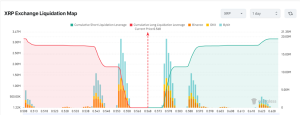Last updated:
 Why Trust Cryptonews
Why Trust Cryptonews

Major crypto exchange Coinbase has unveiled an innovative artificial intelligence accelerator grant program.
The initiative will award $3,000 each to five projects that explore the integration of AI with cryptocurrency wallets.
CEO Brian Armstrong highlighted the potential of large language models (LLMs)—the technology powering AI systems like OpenAI’s ChatGPT and Anthropic’s Claude—to manage financial tasks if equipped with crypto wallets.
“LLMs should have crypto wallets. Let’s help AI agents get work done (on your behalf) and participate in the economy,” he wrote in a recent tweet.
Coinbase Demonstrates Potential of AI in Financial Transactions
The potential of AI in financial transactions was demonstrated by Coinbase’s engineering lead, Yuga Cohler, who posted a demo of the “AI Wallets” feature on X (formerly Twitter) on August 12.
In the demonstration, Cohler showcased a scenario where participants are paid for their contributions to training an image recognition model.
After selecting the best image from a set of three, the system automatically sends a payment to the user’s cryptocurrency wallet, illustrating how AI could handle such transactions autonomously.
The concept mirrors platforms like Amazon’s Mechanical Turk, where users are compensated for completing simple tasks.
However, the implications of AI conducting and receiving wallet transactions are vast, potentially revolutionizing various economic activities.
Coinbase’s Developer Platform is backing this vision with a $15,000 accelerator grant program aimed at exploring these AI-driven economic applications.
The company is encouraging developers to create useful “bots” that integrate LLMs with Coinbase’s MPC wallets.
The grant program is part of Coinbase’s efforts to overcome barriers in AI and finance, particularly the challenge of enabling AI agents to manage payments autonomously.
Developers interested in participating have until September 5 to apply.
AI and Crypto Represent New Opportunities
In June last year, Coinbase released a research report stating that the intersection of artificial intelligence and blockchain represents a major opportunity for entrepreneurs.
At the time, the largest US-based cryptocurrency exchange highlighted the benefits of combining both techs to create new solutions for societal challenges presented by AI.
“As applications within AI and blockchain mature, the disruptions these technologies represent may lead to areas of collaboration and the emergence of new use cases for crypto to help address specific societal challenges posed by AI,” David Duong, head of research at Coinbase, said.
The report mentioned several potential use cases that combine both AI and blockchain technology.
In the first place, it said decentralized data marketplaces could help generative AI meet the demand for a verified and diverse set of data to train its models.
Similarly, token-based incentive mechanisms could improve the quality of data sourced from those marketplaces.
Other use cases include providing computational power from decentralized networks that utilize graphics processing units for AI projects to train their models, improving data authenticity, and making AI algorithm’s opaque decision-making process more auditable.
Furthermore, the report claimed that the combination of AI and blockchain has the potential to address issues such as algorithmic bias and digital identity verification.
It is worth noting that blockchain technology also has the potential to address issues like disinformation risks.
Blockchain and non-fungible tokens can be used to establish the provenance of images, video, music, and other media.
Moreover, blockchain can help make the decision-making processes of generative AI models more transparent, allowing users to scrutinize the logic and reliability of the AI-produced outcomes.

















